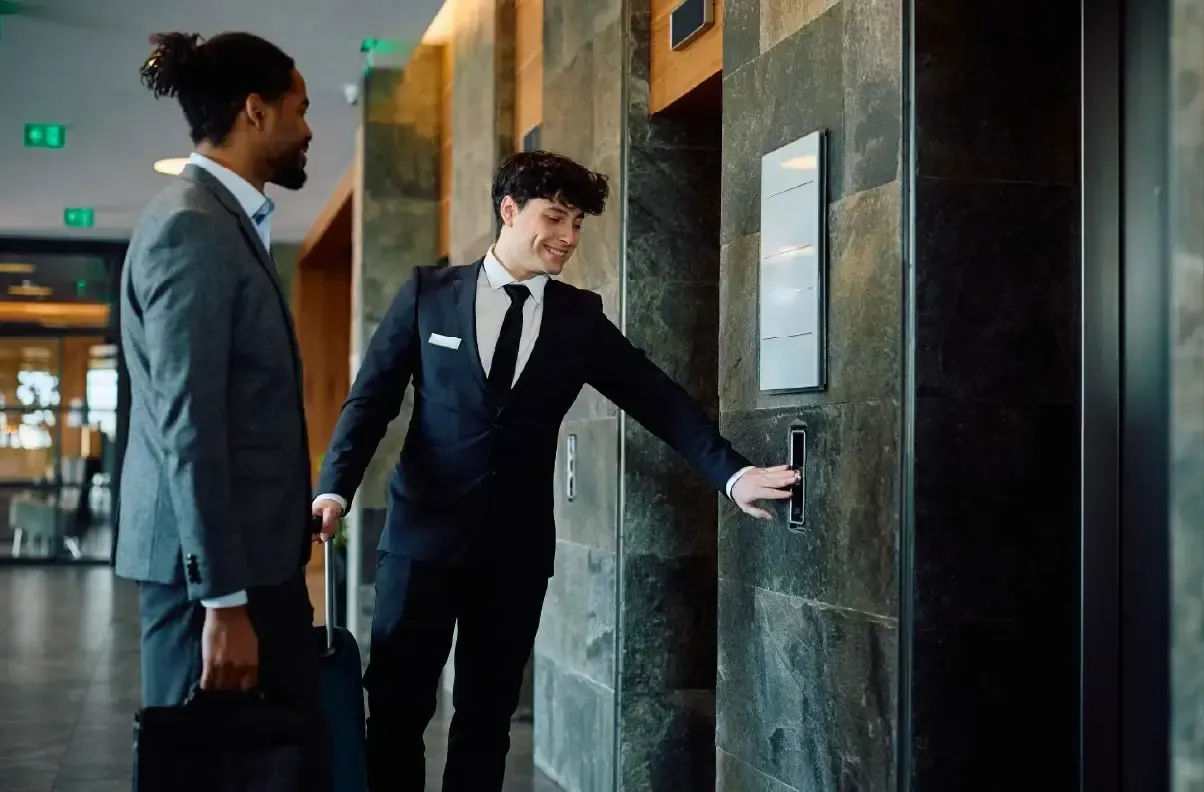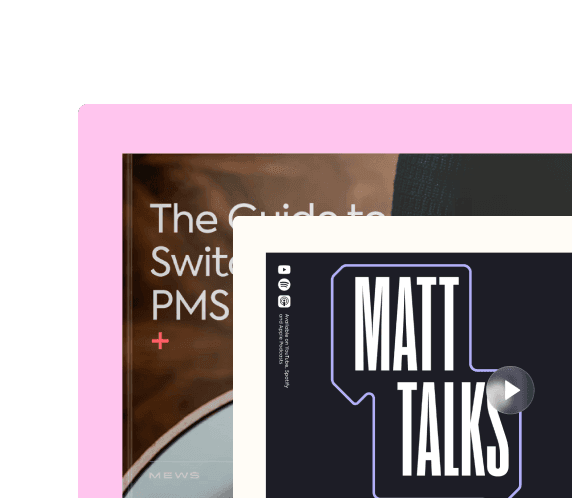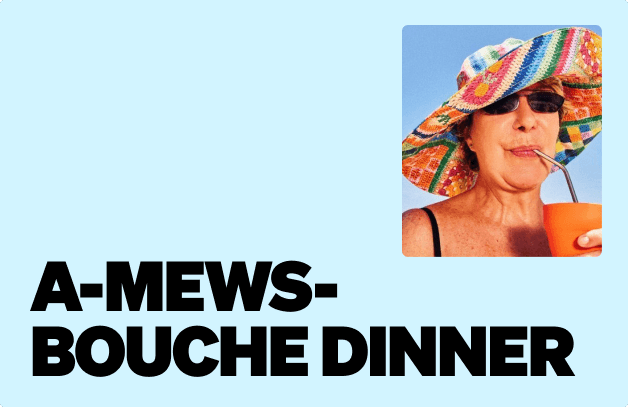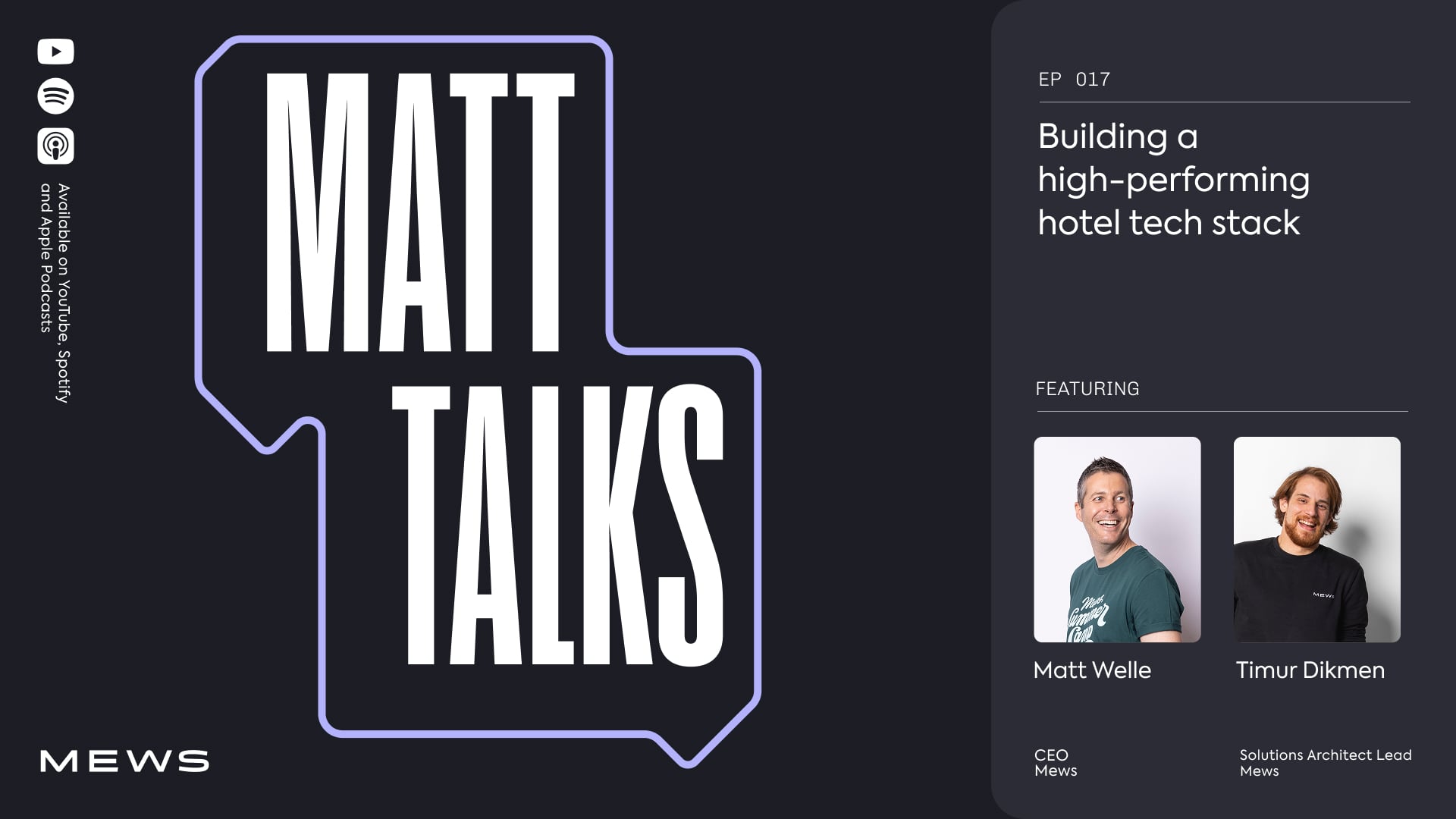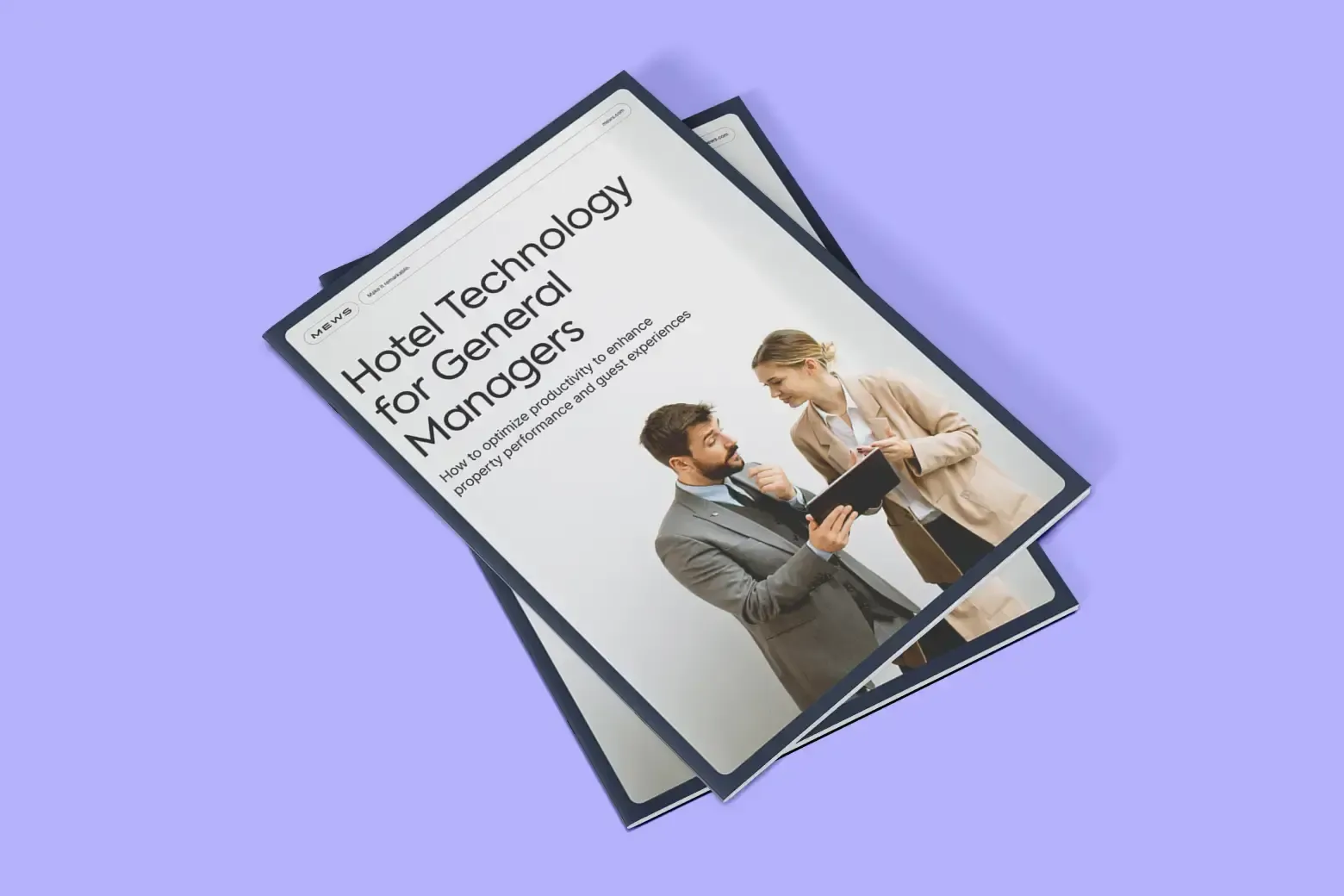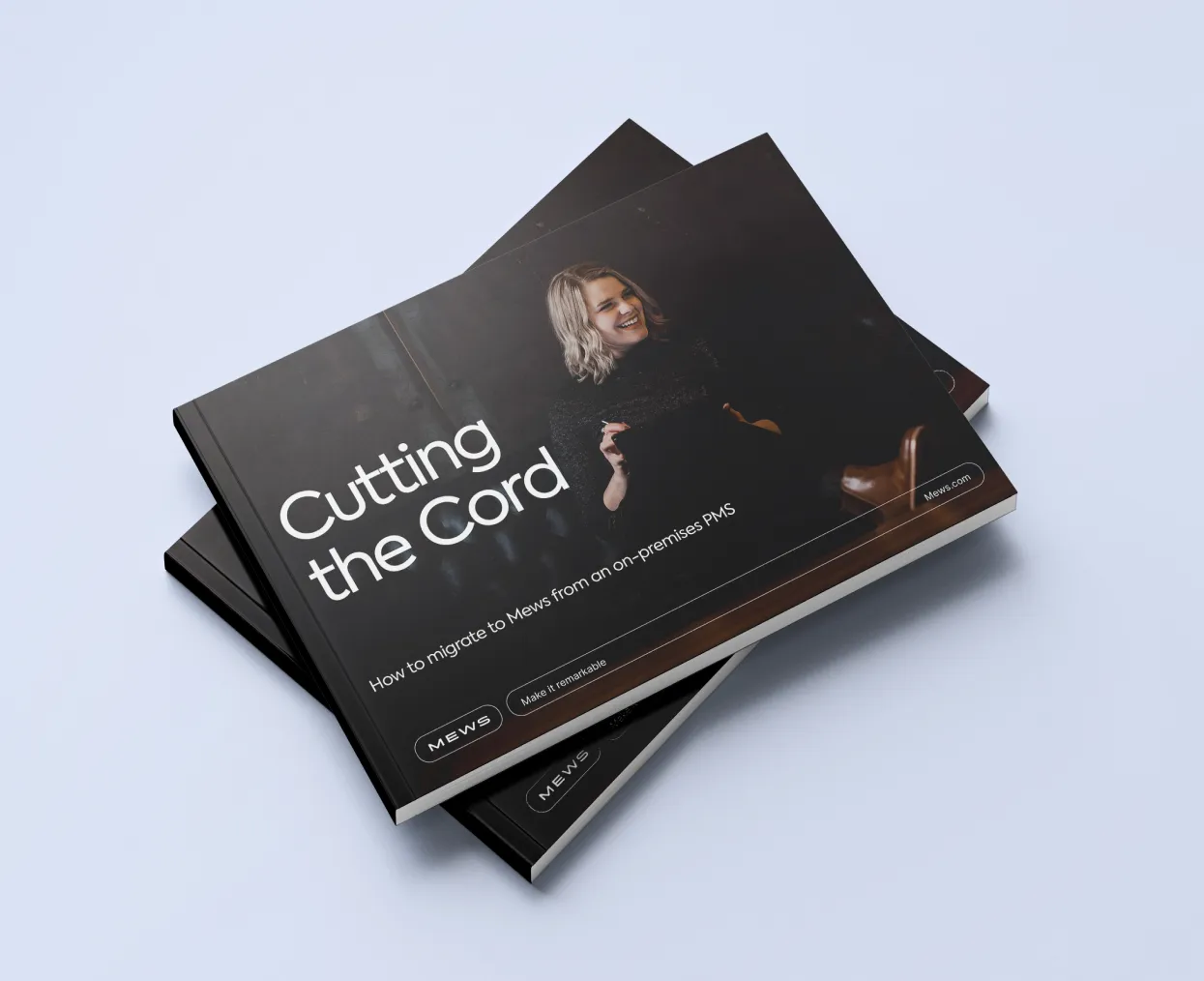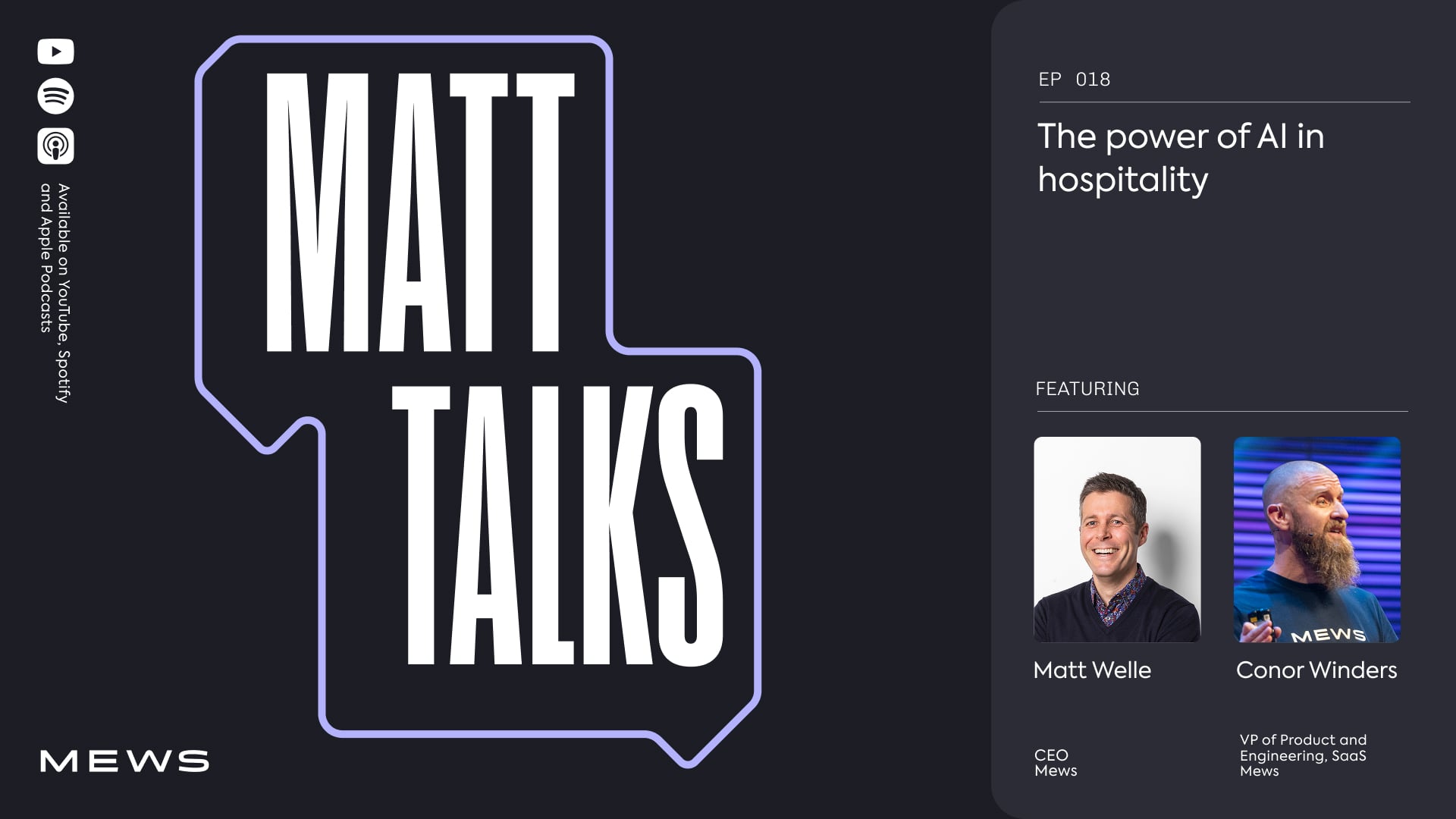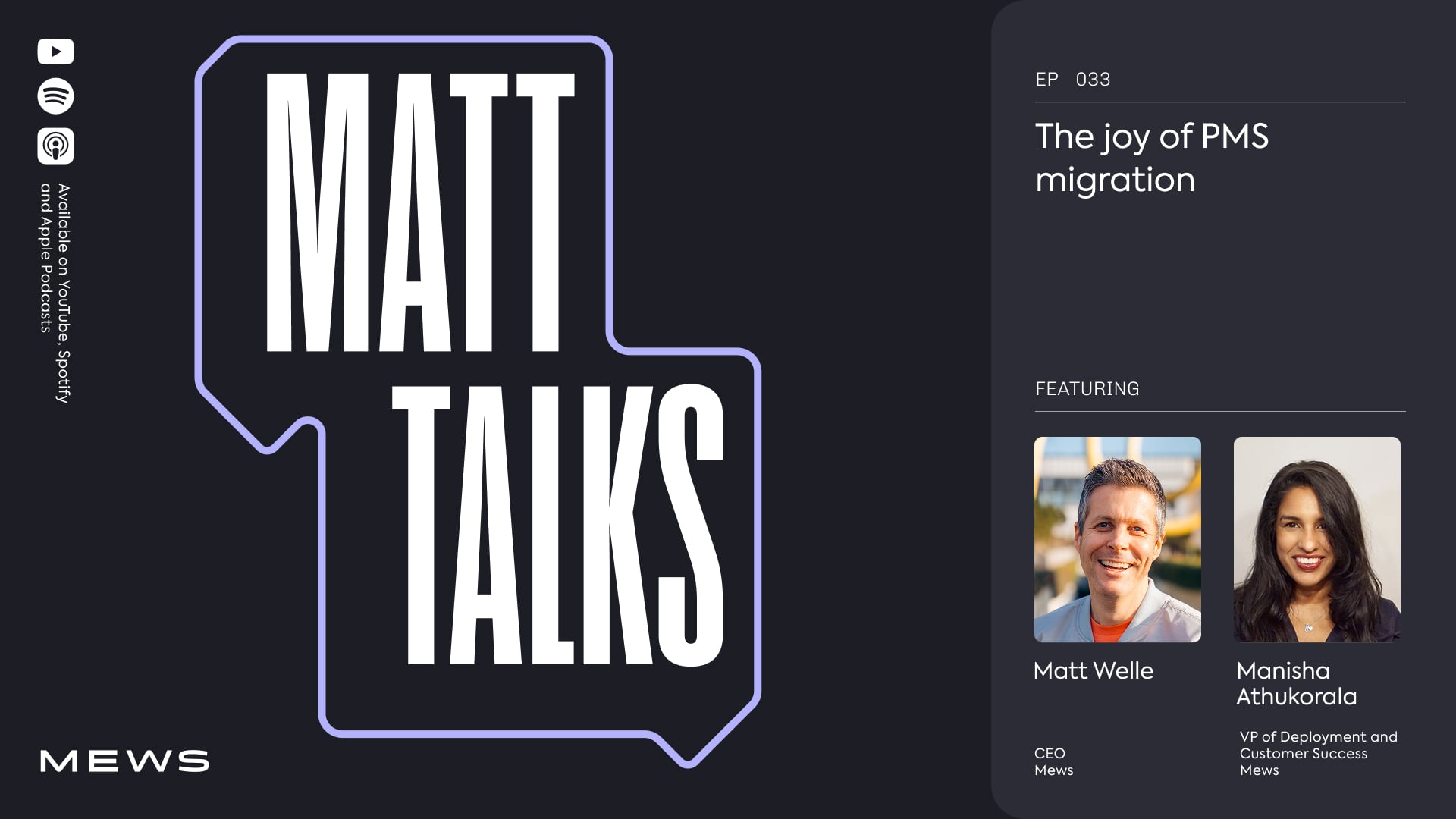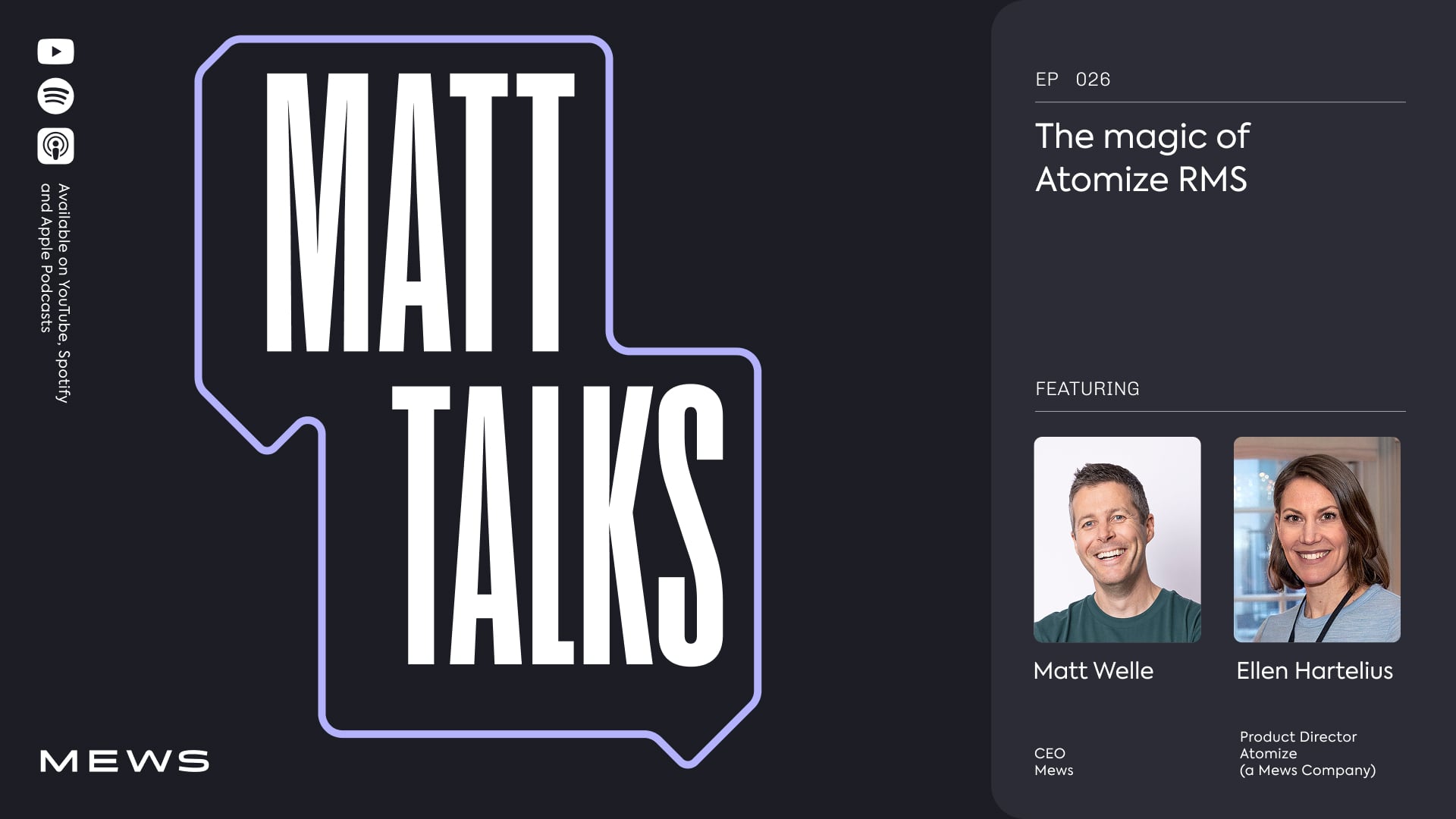What to expect?
Meet your speakers

Matthijs Welle
CEO, Mews
After years in the trenches of hospitality, Matt joined the Mews journey during its early days in 2013. Since then, he’s been our fearless CEO, leading the company and the industry forward.

Timur Dikmen
Solutions Architect Lead, Mews
After years in the trenches of hospitality, Matt joined the Mews journey during its early days in 2013. Since then, he’s been our fearless CEO, leading the company and the industry forward.
Episode chapters
Transcript
Introduction
Hi, everyone. This week, I invited Timur to join me. And Timur works at Mews. And I wanted to just pick his brain on how does a hotel build the perfect technology stack of integrations and apps that they build so that they can create the best experience for employees, but also for guests.
And it is complex because we have a marketplace with over a thousand integrations. And to kind of see through that and figure out what's the right thing for you, we've built this entire team around Timur, a a team around Timur to to kind of build this out. And you've been with us for, I think, around six years now? Correct.
Yeah. Next month is my sixth year anniversary. And you grew up in life thinking the only thing I wanna become is a solutions architect, or was there a different universe?
You kinda just fall into this role, to be honest. But I I think I had just enough nerdiness and love for hospitality to see what the technology could do. And then when Mews came knocking on the door, I was like, yep. Yeah. Yeah. I have to. I have to go.
Behind the reception desk for many years. Absolutely.
Front desk was the place for me to be. I think it's where everything correlates, right? So everything passes by front desk at front point. So you get to see reservations. You get to see accounting. You get to see banqueting. You get to see everything because at some point or another, it comes through front desk.
Nice. And you lead so you, Immuse, I think, have been promoted like seven times or something like less than every year, you kind of have moved up. Is it because you're pushing for that or it's just like being given to you?
Well, I I'd like to say I'm pushing for it, of course. I think there's an element of being in the right place at the right time. It's the I had the so I joined as an account manager, looking after some of the most innovative customers that we had, which which just melded well with what I found interesting. So that's how I got to learn the system inside and out, really pushing it to its boundaries, seeing what we could do with it.
Coincidentally enough as well to this topic, putting together many different tools to try and see how we could get that end to end flow working. And it was that process that just taught me so much about our system itself, but also how the data connects between the various systems, how you should think about setting up a ecosystem.
And so I think there was just the right level of curiosity, the right level of nerdiness, so to speak, as I keep calling it, and the right customer to push me to, to really, yeah, test the boundaries.
Because how do you so so you're not a sales manager, you're not a customer success manager, but you work alongside them? Like, how does it work? At which point do you get pulled in and what's how do you measure the impact that you guys are having?
Yeah. So the way that I like to, the way that I like to explain it is that we are the translator between the business objectives and what the product can actually do, and that works both ways. So we we position ourselves as well within Mews to be the liaison, so to speak, between the go to market teams that sales customer success, and the r and d teams, such as product and engineering.
Because we can understand, hey. What is the customer actually trying to do? Be it a prospect, be it a existing customer. And then help with the translation towards the r and d teams to then define sort of the scope of the minimum viable, so to speak. At the same time, SMU's developed a lot of new things, so making sure that we can then fit that into what our customers might be expecting or didn't even know they should be expecting. We can help with that translation as well. There are, of course, teams that do these things, but we, we definitely, get to add our our stem on it.
I like I like what you said that you actually said the first sentence was around the customer's business objectives. And I think that's just been the shift over the last few years where technology was just a vendor that you just buy a system from, and then we would just run it like we've we've always run things. And this different angle of really starting a conversation with customers like, well, what are you looking to achieve with the system change? And understanding maybe that's guest experience, but maybe it's efficiency. And they are distinctly different things. And for that, you have to design in a distinctly different way. And we're trying to move from this vendor kind of that we are to an actual partner where we deeply understand how we can drive the business.
One of the first things we do when we get introduced to a customer is ask them about the their quintessential customer journey. Right? So from travel inspiration even all the way to post stay so that we understand what is the brand promise, and then what tools will you need in order to fill in the gaps that Mews doesn't, doesn't support today or just how it all fits together. So I love starting with that customer journey in mind.
And, yes, you've got the back office tools that can lock those until it starts the post day, area.
Chapter
Designing a hotel ecosystem
If you if you were running your own hotel, right, you you have your new hotel, you're gonna build it, how would you go about designing an ecosystem for your hotel? Where would you start?
So if I'm an independent, of course, the PMS is the first and foremost. It is the core of my system because it handles, it handles everything. Second is always going to be distribution. These, I think, are just, they're non negotiables.
You need them to even be able to appraise. Depending on the size of the property, you would then start thinking about, okay, well, I'm taking reservations. I'm distributing it. I need to account for what exactly.
So accounting would definitely be a good one. I think we still see a lack of adoption of accounting software actually being used.
What do they do if they don't have an accounting software connected?
Export export a bunch of reports into Excel and, copy paste from one to another.
That's painful.
Yeah. Yeah. Yeah. I, I just have to do it myself. Even though we had an accounting software, it wasn't integrated. So we would do the night audit reports, export them out, and then I would sit in the back office for a couple of hours just, porting numbers from one Excel sheet to another.
Yeah. I laugh because I I remember this.
Yeah. Yeah. It is. It is actually disappointing to hear that this is still happening in hotels today. Like we all think that everything is cloud based and everything is interconnected, but how often do you find that it isn't?
I mean, just looking at our numbers, we've got what? Close to six thousand customers now. We have about three thousand one hundred accounting integrations last time I checked the numbers. So it's, yeah. Now, now there are some that have file exports, which sort of it might not fill up in our reporting, but it's still it's still a lot considering the day and age that we're in. Even a small independent property, you can get a I don't know. I don't know if I'm allowed to name names or not, but get QuickBooks or something like Exactly.
They I think Xero is one of the best accounting integrations that we have where it doesn't just once a day dump a bunch of revenue data into Xero so the account will have the data, but actually it connects, I think, all of the invoices as well. Right?
Yeah. It's an API connection. Right? So as the the time elapses, so to speak, it just it feeds into the system.
And, yeah, bundles up into, I think, a daily batch and not yeah. Exactly.
Right. To keep you completely off track. That's okay. Yeah. You probably have an ecosystem. Let's go back to that conversation.
So again, if we think about it in that customer journey, right? So you've got the distribution as in you're able to reach them, but are you reaching them at the right place and at the right time for the right price? So revenue management, I think, could be a no brainer in today's day and age. And it's about the same as the accounting, integration numbers, a bit less, actually.
But fifty percent don't have a revenue management system. Correct.
Yeah.
And it just, it Why would you try to do something yourself that you can have the tool automate and actually just have do all the calculations and stick to the whole So what do you hear over customers?
Because I just it baffles me that half of hotels are amused, but actually it's I think it's about ten percent of hotels that's that don't, that have a revenue management system worldwide and ninety percent don't have it. What do you think it is?
I mean, so the percentages that you're mentioning, it's probably the, the oversized amount of independent properties that don't actually realize that they need it. I think it's a lack of education, if I can be so blunt about it. Because, well, why not? Right?
I've got a high season. I've got a low season. I've got an in between peak. So I'm going to maybe price it out in advance for each, call it four different seasons within the year.
That's not how demand and supply works, right? It's short. That's where you can start. But then you really want to get granular, and you want to make sure that you're almost tailored to the person, and the revenue management system can do that.
And without having seen those benefits, without actually knowing that there is a tool that can do those calculations, I think, let me try and phrase it a different way. I think there's a, I'm not I don't want to take away from the focus on the guest experience, but if you think about, independent properties, again, small groups, there is probably an an excess focus on that guest experience, which makes sense, of course. But that means the energy is not being put into, hey, what can I what am I actually not doing with my revenue management or my rates? Yeah.
Yeah. Yeah. Because packages we see. Right? And that is a form of revenue management. But when I talk about revenue management, I'm really talking about the the dynamic nature of the economic behind high and demand of of the beds that you have.
Again, it's so good. Like, I I find always that a lot of hoteliers, they they like the control element of being able to just set their own prices. But then when you see once they enable the revenue management system and we have this historic data that we see from the prehistoric time before revenue management, then then we see post. And it has, it's above average growth because obviously inflation drives the prices of hotels up. But those hotels that have embraced autonomous pricing, they really benefit from it. And I think we're obviously looking to write more about this and make, give this education because it's an educational piece that we have to get through.
Chapter
Why revenue management tech is so important
It plays for itself. Right? That that is the truth behind it. I think there's two tools that you can think about which are just self, funding, and that is an upselling tool and revenue management.
They just needled such results regardless of, let's say, everybody in the world is using an RMS, it's still going to help you drive better revenue than without an RMS, right? Just because all of these RMSs are competing for the same, they're still optimizing. So it's, yeah, it's a no brainer, and it pays for itself.
So how would you build, a different ecosystem for a different brand? Because I think brands sometimes want something completely different. So how do you help hotels prioritize where to focus in these thousand integrations in a marketplace?
It's the brand promise. Right? So it's the complexity of the tool or the feature set that the tool provides. Let's take a kiosk as a good example.
You might think that a kiosk makes sense for for every type of property, but that's not always the case. So you, you'll want to, or a hotelier should think about themselves as what is it that I am providing my guests? What's the experience? What's the promise?
What's the ethos of my brand? And accordingly, you can then determine, okay, upselling or the amount of times that I try to reach out to my guests with upsell suggestions, recommendations. Do I want them to self check-in or not? The complexity of the satisfaction surveys that get sent afterwards, the data that I want to collect from that.
Like, these are all things that go into the selection of the tools. You now, I mean, we do this as a company as well. We look at our tech stack or as time goes by and we say, hey, do we have, sorry, is able to do part of what this tool does. That's fine.
You can consolidate tools for sure. But make sure you are solving for a particular problem, and you'll identify that through the customer journey, through the particular problem, and you'll identify that through the customer journey, through the operational journey of the staff members of, again, that that brand promise. Where is it breaking? Where is it inefficient?
That's, I think, the best way to think about it. To this customer journey.
Because if you, look at a smaller independent hotel versus a, like, a mid market, we call it when you start to have multiple hotels that are interconnected versus a massive brand, like a Best Western, How much does the ecosystem differ between those?
It will differ once the larger you get, the needs change of the business itself, and that's where it starts to differ. So when you, I guess, I guess when you need more back office tools, so to speak, because an independent cares about the guest experience, like I mentioned, a group of hotels, say the threshold is around three, three properties maybe. As soon as you exceed over three properties within your group, you need to start thinking holistically. You need to start thinking, how do I replicate the brand promise that I have over a larger portfolio of properties?
And that's when you start thinking about multi property. So any enterprise like features that fit into or that allow you, sorry, to manage your properties from within this headquarter, aspect. That's what you start need to looking at. So an RMS again and accounting again.
It is all provide these types of tools. MEWS has that's why we've built our multi property feature because or function, I should say, because that allows you to aggregate all of those configurations into one. And enterprise, on the other hand, the business model completely changes with an enterprise because then you go into franchise, then you go into different models of ownership and different business models. So there, what is the core, sort of the core feature?
It is the guests, but in terms of loyalty, in terms of the customer base that I have reached to, and how do I actually reach them? So distribution and loyalty become the core elements there. And with the EMS, if you think about Muse or if you think about, any of the other tools that you might add into your ecosystem, they then become the they digest the information that gets transferred down from the central reservation system, essentially.
So so what I'm hearing you say is saying, every hotel is like a baseline that you have to have. Like, you've got to connect to booking or commerce, to Expedia, so you gotta have distribution covered. Everyone has accounting systems because we all have to pay taxes, so you gotta have an accounting system integration. Everyone should have a revenue management system if you think about, you know, it it's just so good. But the moment you've got the baseline covered, that's when it starts to differentiate at the top of where where do we lean into? And we did a lot of analysis and we started segmenting our customers according to, well, what is this type of hotel like? Is it a leisure hotel or is this a business hotel or is it a mixed hotel?
Chapter
Differentiating leisure and business hotels
And then the tech stack above the baseline starts to change. Can you maybe give some examples of how, like, a leisure hotel differs into that top line kind of integrations versus a business hotel?
Yeah, of course. Right. So Leisure, I think self explanatory, it is that that I go on holiday. I want to be pampered.
I want to enjoy my stay. So there you're going to be looking at, okay, well, how do I make sure the guest is building up that experiential stay? I don't know if that's a word, but that experiential stay. CRM pre arrival communication, it modeling becomes crucial in that sense.
Business hotel in that sense. How do you fill up your business hotel? You offer MICE functionality, So, or MICE services within the team. But it's MICE.
Meetings, incentives, conferences, events. So anything from your wedding to a big event, let's say, a muse needs to get everybody together in one place, That will fall under MICE. So then you start diversifying, again, how do I get them in? So you're thinking a distribution element of these different spaces that I have within my property that need to be filled up.
It's contracting because you'll have corporate rates, that need to be, that need to be contracted as well as distributed. The actual hosting of the items that are consumed throughout the stay then need to communicate. So you've got three different elements. By the way, I completely forgot point of sale, but you've got your point of sale working together with your event management system, working together with your PMS, which then all coalesce to go into your campaign system.
So I think it's the services that you add onto your property that will define the additional tech stack that you need.
Yeah.
And we talk about the leisure hotel.
We call it a personalized service because that's as a leisure hotel, you really wanna build that connection with the customer. And then you're clearly looking to build a connection because they've come to enjoy either the destination or the hotel, and you've gotta have a way to, throughout the stay, connect with that customer. So that's where we leverage integrations like CRMs, like a like a Book Boost or like a Runner AI or DUV who in our marketplace are doing incredibly well. And then once you get to the business hotel, they're looking for frictionless.
Like, they are looking to get into that room as fast as possible. So, like, a digital key might be one of those thing that they are really looking for because they've got short times, short stays, like one to two nights. So high volume, and you gotta get them into the room as fast as possible. So kiosk might be deployed there.
So the tech stack does differ significantly between those two categories. Yeah.
Absolutely.
And then it's how you how you use it as well, right?
So the last property that I worked at, we had both business guests as well as leisure guests. So the way that I interacted with them was completely different, but I had one set of tools that I had access to, and it was more geared towards the leisure. So my favorite check ins in those days were businessmen that were still on their telephone, but I had the key already. I had the credit card already.
I had everything. So it was just like, they would come. We'd sort of nod at each other. I do my thing silently.
They'd be on the phone, and then within thirty seconds, it's done.
I had to do that all manually, so to speak, right? So if there was a way for that businessman to do their online check-in, to receive their digital key in advance, to communicate with the hotel, to let them know that they forgot their toothbrush, for example, Like those could have those would all be tools that you would look for to enhance your offering to your guests depending on who they are. The leisure guests, they want to come. They want to speak to you for half an hour. They want to ask about the city. So yeah.
Chapter
How to assess and change your tech
Yeah. Once we've come in and they've changed the PMS and the whole tech structure, how often should you relook at your tech?
It's a continuous thing, like I said.
So one of that's why my team does both existing customers and new customers. So when we're speaking to prospects, then it's you're going to change your PMS. What other parts of your system can we look at now that might that you might want to consider changing? What are the absolute non negotiables that need to stay for whatever various different reasons? And what are you sort of, you thought about, but you haven't considered it before? Maybe it's a good time during that switch of the PMS to actually add these tools on immediately.
For existing customers, then, I mean, we do quarterly reviews with our customers anyways, where we then just look, Hey, how how is it going with the system? Are you adopting it to its fullest potential? But that is then already a moment to say, Do you see any inefficiencies within the way that you are operating?
Is there something that you feel you're not succeeding in delivering that brand promise? So I would say it's a continuous thing. Definitely once every six months, you should just have a quick scan of how are my processes. And the big brands and enterprises do this.
They've got their QA checks. They've got their, you know, the the the mystery shoppers that come by. I think they're a bit slow to to enact change, to be honest. But, yeah, that's it should be an ongoing thing, and you should have a way of measuring and scoring the effectiveness of the tools that you that you purchase.
Like, you and I, we traveled recently to Germany to meet with a customer, and they were already running on Muse for over a year. And we recognized that the customer wasn't particularly happy. And we said, let's just come on-site and let's let's look at your tech stack and seeing what is it that you're looking to achieve and what are we actually doing in our house the system used. The first thing we did was again looking for the customer objectives. So I said, what's your company vision? Like, what are you looking to achieve? And at some point throughout that, they said, we're looking to drive ancillary revenue and we're looking to drive more efficiency across front desk.
And, like, we just picked up on some of those things and put them on a whiteboard. And then we said, okay. How do we help here? And we went out of that meeting room, and then we went into the lobby. And we saw that the kiosk was hidden behind the reception desk. And the kiosk was doing terrible numbers, like, below three percent of check ins.
And we really said, okay, first of all, that kiosk needs to be the first thing you see when you walk through the door.
And then there's no upsell product built into this. So we took what their business objectives were. And then we started really thinking, okay, who's an integration partner? And then we asked Okie, who's a great upselling tool, because you talked about upselling and we said, Okie, you know, why don't you come in and actually help with this upselling?
And once you start focusing on the objective and then saying every month, we're gonna go back to this number. And if it isn't good enough, then we might swap something out in the tech stack. But it's this constant evaluation. And I don't know if you know back in the days because when we both worked at these big hotel companies and when you buy an integration, you're stuck with that thing for many, many years because it's a massive upfront, but that isn't the case anymore.
Like, you could very quickly swap out different integrations. How long would it take if I wanted to swap out a revenue management system or an upselling system today?
I mean, it's a question of how fast can you port information from one to the other. And because it's API connections, in theory, it's super fast. Right? It's, you don't need to go into the local server, download it, format this, that, upload it into a new one, install it.
So it it can be within within a matter of of weeks, really, just depending on the availability of everyone involved, actually Yeah.
Get down and do the task. I think that is, the the thing that takes the longest amount of time of finding it in, the actual transfer of data. As soon as you've got so this was a point that I wanted to mention as well, actually, when thinking about a tech stack is the way that you should the way that you should think about it is, as I mentioned, it should solve for a problem or a particular piece that you're trying to, that you're trying to solve for.
Chapter
Data and guest experience
But there's two elements of that. There's the transaction. Let's call it the transaction itself or the action itself. But there's also what data can I collect from this transaction? What will help me enhance a further part of the customer journey or the cycle, the operational, efficiency behind it, the reporting, whatever it might be. So that is something to consider as well, right? How can I use the data that I've collected here, either because I have to or because I want to, and then feed it back into the system to then ultra personalize or, you know, yeah, ultra enhance that guest experience and so on?
Can you give me an example of that? Because that feel very theoretical, but I I I'm sure you have some examples.
Yeah. For sure. So, I mean, the the the most basic or textbook example of this, I guess, is a pre stay, is a pre stay, email that you send out. You say, hey.
This is not upselling that I'm referring to. It's more just like, what are your preferences? Right? So you send some sort of form, form as part of the pre arrival flow.
They inform that they have, allergies or that they have a preference for yellow gummy bears instead of the green gummy bears. And then that can be fed back into the PMS. That then gets them delivered to, for example, a point of sale in room service who or guest relations, I should say, who are going to place the gummy bears in the room, and they can sit and, you know, pick out the green ones because they don't like them. And that then gets sorted into the CRM system where the preferences are stored to begin with.
And then the next time you wanna get that guest into the property, you can say, hey, or you can send them an email that says, hey, mister guest or missus guest, you know, based off of these preferences, we hope that we were able to meet them for you. And if you wanna have another state like that again, like, these are all dynamic blocks of of information that you can use within the entire ecosystem. And it's a basic example, but it shows that from pre stay, you can reuse all that information later to try and entice them to come back again for another stay after they've left.
I had this I mean, the day I stayed in a hotel in Vienna.
And then I must have at some point in a pre stay survey said that I was lactose intolerant. God, no. When I tell that to people and I didn't know that I said it until I, on my second day, I opened the mini bar, and there was, like, a bottle of lactose free milk in the mini bar. And I thought, did I say that?
But it was one of those moments where I thought, that's really, really good. And it was such a like, it doesn't cost much to put a little bit of lactose free milk in the fridge, but it meant a lot to me because it is so hard to deal with allergies or dietary restrictions. And it's things like that where the PMS has dietary restrictions as a field, and they can be pulled by, for example, the point of sales in the restaurants who are putting these things in the minibar. And that's one of the thing like, it's a such a small thing that we deployed last year, but it's so powerful when you see it in action and you're like, this is scary, but it's really good.
And for most friction from you as the traveler. Right? So you don't have to think about, or if you go back to Vienna, I'm sure you're going to book that hotel because you know that you don't have to worry about giving them that same piece of information that you have previously done. And we've been doing this in systems for a long time now in the form of notes, reservation notes, whatever notes, phrases, alerts, whatever terminology was out there.
But it it wasn't connected or integrated. And that's what you need to think about now with your tech stack. It's not enough to just have a feel to collect some information. How does that get fed into the next part of the system so that you can reuse that, recycle it, and then yeah.
Yeah. Like you said, give give a great experience.
I saw something today that I'm sure I'm not allowed to talk about yet, but I'll do it anyway because I just I think it's it's the future of where we're moving towards because last year, I think last year in December, we had a match and merge where we can merge profiles based on if I just go to the restaurant and pay my credit card, we can now recognize that that is actually linked to your profile. We can merge them. So, we've been building out reporting around this on the guest profile. I can now show you how many times you stay, what your total value is as a guest. So that we really think about more than just room revenue, but we think about total holistic guest revenue. And I think this is when it gets interesting when you start looking at your tech stack and you have an objective to make more revenue. Suddenly, we actually have a way to tell you what your Trefpar, like, total revenue or available space would be.
And we're we're definitely inching towards getting that released in the next few months. And I think that will help shift some of those conversations that you're having with your team to help saying, okay, actually, there seems to be something off in your ecosystem. You're not driving the right behaviors because people are not buying more than just the room rate at your hotels.
Yeah. Agreed. And, look, what I love about this is we talk about the personalization of stays. And let's be, let's be kind of blunt and honest here.
What does that actually mean in today's world? That means I have a placeholder that says, Dear name of guest. That means I've booked a product, and therefore, on my confirmation email, I might add a text that says, I hope you'll enjoy the stay. It's not personalized to the guest.
It's personalized to whatever it is that we can automate, but is dynamic enough. Once we understand what the guest actually likes to purchase, once we understand what items they have a propensity to buy and to enjoy, then you can start to personalize that service better. It's not a reaction to an action that has occurred by the guest, but it's actually, look, you've stayed with us this many times. We've kind of seen what you like to do.
We've spoken with you. We've added our notes ourselves. Now we can really speak to you and say, hey, yellow gummy bears are your favorite thing. I'm gonna make you a cake of yellow gummy bears or whatever it is.
Yeah. I don't know.
Chapter
Best of breed vs. single vendor solutions
Don't make me that cake.
Sorry. New new part. There's one thing that I that's, one of those topics that's been out, and companies have moved from best of breed to, you know, single vendor where you buy everything from how do you feel about this? Because it's quite a polarizing conversation sometimes.
It is. I I can argue both sides. And I I have argued both sides, and I believe in both. So it really depends on the vendors themselves. So let's start with best of breed. Why is best of breed the choice to go for? Because it is the best of breed, as in you are going to get those that are solely focused on solving for a particular problem through their tool, meaning that they will always have a a one up on the feature set that's there on the the UX that it provides.
And that's why you would want to consider going into a best of breed Where that where that sort of breaks, I guess, and where a single vendor then becomes the right option is because you can focus on a particular problem for so long before you start to diversify your product offering. Maybe that is not in line, or the other tools, you've created such a good product now as a best of breed, but the other tools in the ecosystem aren't keeping up with the same level of innovation, with the same level of change. So they may be offering it, but does that communicate with the rest of the ecosystem?
Which is where a single vendor then has its first pro or first benefit is that the tools that sit within that single vendor, they hopefully are growing together at the same pace at the same time. So you can start to see some really innovative and really interesting things occurring between the various products that sit within a single vendor.
The drawback is then, will they have enough, investment to be able to provide into all the various tools? So you're going to get tools that are going to be at different levels of maturity, but they're going to continue growing. And it again, it's it's the sum of the parts, right, that I think is the thing to look at. Which ones together in unison give you the right thing that you're looking for?
Yeah.
So I can argue both ways. Like I said, it's, it really depends on the need. Yeah.
Yeah. I think if we had to have a rule of thumb, often we say if you're a smaller hotel, you don't want to spend a lot of time talking to ten different vendors. So potentially there you might just want to buy the majority of the solutions from one vendor. But at the same time, you want to make sure that, you know, all of the tools are independently good and that they serve a purpose.
There might be some gaps because you always there's no perfect product on the market. But but it makes it easier because you're a small hotel. You don't have time to just negotiate with ten different vendors. Whereas if you're a hotel chain on the other side of the spectrum, you probably have an entire team that looks at what the functionalities that you need.
You need some of these very advanced solutions, for example, on the event management side, but actually maybe from the point of sale, you could use the same vendor.
And, we're seeing that is kind of the rule of thumb, but it doesn't always hold up because sometimes you find these really, really innovative smaller hotels who buy several integrations from the marketplace, where some of the big chains actually completely buy everything that we have have at Muse.
I think that is a remnant of the past, so to speak. Right? There were just fewer suppliers back then, so fewer options to go for those that were successful in their tools, purchased more tools, and therefore became that all in one, which is what a lot of the I'd like to think of it as like a bell curve. Right?
So you've got I should probably do it this way. Should I do it that way? You've got all in one on one end, all in one at the very other end, and then you've got best of breed sort of in the middle. Sorry, inverse.
Best of breed, best of breed, and all in one. So you've got what we consider mid market customers, so to speak, that are, call it up to, I don't know, up to fifty properties maybe around that area, that are going to want to have everything from one particular vendor, for the reasons that you just mentioned, then the independents that are up and coming that are like, okay, let me test that actually. I've got Muse's marketplace. I've got x providers marketplace that I can just quickly interact with, see what actually works.
And then you've got the really large ones that have a couple of tools that are mandated across the entire portfolio, but then everything else is is up for grabs, so to speak.
Yeah. Yeah. So you see, I guess, through the evolution what the philosophy is. But, I was going to say, sorry, I think that's a remnant of the past because, again, you've got these single vendors that were able to build out this set of tools that they have, and it's the fear of changing it.
That is something that I think is that this trough down here has a difficulty overcoming. Yeah. Yeah. Because now they have to go from one to multiple vendors.
That might be for the best.
So so we've obviously done a lot last year. We've done several product acquisitions, and we've always been best of breed where we just work with the best partners out there, and we are agnostic. And you just integrate whatever you wanna integrate because they're there. And then suddenly, we have some solutions.
And we've been very strategic about what solutions we believe should be getting close to the core because we can influence the roadmap. And for example, we started with point of sale a few years ago where we have fabulous integration partners, but most of the point of sales are built for standalone restaurants. Whereas food and beverage in hotel is a unique thing. Like we've got room service, you've got poolside service.
We've got lobbies where you've got, you know, you might not have staff walking around, you've got co working spaces. So the complexity of what happens in a hotel is beyond what happens in a normal restaurant.
And this is really why we brought that in house because we want to make sure that Muse PMS plus Muse point of sale plus payments plus door locks, like that whole connection is powerful. So that when I now walk into the restaurant and I can tap my key on the point of sale, because we've cut your key for your room, the PMS is there. We know that you're lactose intolerant. All of these dots have connected. And that's really what we're leaning in into with the ecosystem. So we still have these fabulous integrations there. But if you're really looking for a very deeply embedded integrated solution, we wanna provide some options that are targeted specifically to hospitality.
Absolutely. That's one potential flow that you've just explained.
There are other point of sales that have a lot more features that we do that can serve the various types of outlets, as we call them, a lot better than, than we can at times, right? So yes, our point of sale will probably eventually get to a point where we can service all various types of F and B outlets. But today, it can't.
But what we can do is, like, you just we can speak to the other tools that we have within our system. And it's mostly about what do you as a hotelier care about and what's the experience you want.
And this is where we use often a tool called Miro, which is this online whiteboard that we use to cooperate. But it's because we're remote. So me and Tim are we live in different places and we're not in the office together all the time. So we map out these, these touch points with customers and saying, this is what I want the experience to be.
And you first map out what that whole experience is. And then you start like looking, okay, what's in the marketplace that can serve this thing that I want to do? And actually most things you want today are possible, but it comes at a price tag. And that's obviously then the decisions that you have to make.
And those are the hard decisions.
Correct. Yeah. I like to think about it as well in terms of so when we're drawing up that customer journey, it's what are the actions that it that the staff are currently doing today? So say you have an existing property or not a a completely new build.
What are the actions that the staff are doing today? What are the actions that your existing tech stack is doing today within the steps that go from, again, travel inspiration all the way to post day? And then where can we optimize? And that would be to your question earlier, how regularly should be thinking about these things?
That's just the exercise. You should pull up that Miro board and say like, Okay, I worked on this part. Now let me work on this part. You don't want to do too many large changes at once.
Focus it a little bit, because we do see that happening, and then the order of go becomes important. So I'm just to go on a slight tangent. We had a large customer that, let's see what they do, they changed their sales and catering tool before they changed the PMS, which meant that the EMS had to the sorry. The sales and catering tool had to first be configured according to the setup of the previous PMS.
While then we switched out the PMS and we got in place, and then the tool this sales engagement tool had to be, yeah, had to be configured again for so it was a bit of a probably the wrong order of go. Right? You would have probably wanted to go core system first, and then based off of the new configuration, set up your new, your new sales and catering tool so that that flow could then become a bit more seamless. Yeah.
Yeah. So it is important. And and like we said, you don't wanna go too many different things at the same time. There's just some of these core tools that are very important to think about here.
Chapter
AI in modern hospitality
And the last topic I wanted to touch on is AI. Like, obviously, everyone is thinking about AI and and what's your view? Like, what should hotels be doing right now with AI?
Yeah. So it's still very nascent. Right? That that's just a matter of fact.
But you hear the the term of agents, I think, is becoming a a regular thing. I actually, I follow, YC on on YouTube, and they even sent out a report recently that said, we wanna fund companies that are going to do b to a, so business to agents, which is super interesting. And for the hotel industry, this is very, very interesting because I made a little quick to, personalization a bit earlier.
There is a level of analysis, so to speak, required by humans to look at all the various touchpoints that they've had with guests, look at all of the different notes, and see what data exists around the guest there.
Agent can do all of that for you, and then can take an action accordingly.
The way you're thinking about building your tech stack, what you really want is pools that have clean data that, an agent is able to to ingest and then make sense of to go and speak to the rest of the ecosystem. That's the way that I'm thinking about it today. I think the implementation of AI that we have so far is not clean enough.
Sure, an element LLM can parse through it and sort of get an understanding of what's going on, but, really, you want to have some data in there that is replicable, that is understandable, that is, I forget the word. Sorry. That is stream yeah. That that's consistent. Sorry. Consistent is the word I'm looking for. So you want consistent data, in the system.
Yeah. Like and I think we're just at the beginning point of it. So we've deployed AI in our system so that we can service it at check-in or at checkout in a tweet size. So we summarize everything we know about these guests, but we want more data from our partners and our API allows it. But those partners are not used to pushing data back into Muse. So, for example, review data. So we have some integration partners that, you know, they get customers to leave a review on Google or Tripadvisor.
We would love that to come back into the PMS so that we can use it so that next time this guest stays, we can actually use that in a smart way to then improve the experience. And again, when that sits in Muse and then you've got a CRM integration, like a bot that sits there, it can then take that data and say, okay, this guest complained about the breakfast last time. So let's do something about that. But it's just, we need the data because that's ultimately, we're at the heart of it and we integrate to everything that sits around it. And this is just, it's gonna take time to get all this integration partners to push as much data up and down the different pathways.
If I understand the technology correctly, I think they just need to sort of format it for us, to be honest. And then we can build the agent that's going to consume it. So as long as they provide us with an API that our AI could ask information from to say, Hey, what has been the reviews recently? What has trend been?
What has the sentiment been? Then our AI would be able to aggregate all of that together. So we need it we need it from distribution. We need it from CRM.
We need it from all of these tools to then have the PMS be the one that shows the receptionist, Hey, by the way, you know, this, this, and this happened. They are prime for this upsell, or don't forget to tell them that, you know, we've added the lactose intolerant milk into the mini bar and so on and so on. And so, yeah, I think that's the way that we're going to see it. It's going to be just like a little, like an intern reminding you of things that have occurred.
I think that's the way that I see AI really enhancing the get stick variance. Of course, we'll have the distribution element of it, making sure that we're actually focusing our marketing dollars into the right places at the right time because you've got the historic data of who's coming from where, which demographic, where are they today? How can we reach them the best? So these are all super interesting things that will occur as well. But before we have, I think the infrastructure for that side of it will be much quicker to actually enhance the guest experience itself. Last question.
You're going to open your hotel and you've got your baseline tech stack, but you only are allowed to buy one category of app.
Like, what's the thing that you would really say hotels should be looking at implementing?
Integration management, to be honest. So it's, it's maybe an interesting term, and I don't know if many people, people will be familiar with it. But imagine a Zapier where you can then own the business logic of a lot of the tools that you So yes, there will be native integrations. Yes, there will be native integration functionality.
But as hoteliers, we like to be different than the next one down the road. And the best way to do that is to own some of that, connectivity, so to speak. So I would go with a, depending on the size of the budget, of course, but a MuleSoft, a Zapier, a, what are the French, imagine software, I think they're called.
But you've got these great integration softwares where you can just tweak a little bit.
Right? So So now I can't ask not ask for the follow-up question. So a Zapier, is an if this, then that tool, right? So if this happens in the PMS, then use this software to do this action. And it is honestly one of the most used integrations in the news marketplace that is probably most hidden as well because, you know, you don't think about it.
So what's your favorite Zap that you would have had if you were at the reception desk that you could have made your life easier back then?
Chapter
Automating guest experience
So in the PMS systems that I worked at, which I'm actually happy that Muse doesn't do it, but we had these alerts that would pop up. And they were just reminders that things you needed to do because, I don't know, because they were a virtuoso guest or, or final tells and resorts, or we needed to call the GM, or we needed to give them there you go. Or we need to give them a envelope at arrival, or I don't know. There was just a plethora of different alerts.
It is in your system to close that alert as fast as possible, and you don't read those alerts, nor should I have to beat those alerts, right? That should be the trigger. So the if is to have an action performed. Performed.
Like, that GM is a good example.
Right? So Mhmm. The notes used to say, call GM on arrival for welcome or something.
And it's the most awkward thing because you now have a VIP in front of you.
And I'm supposed to pick up the phone and say someone, can you sorry, mister Jones has just dragged me to VIP. Like and what it can now do is saying, okay. If mister Jones, VIP five, arrives at reception, send SMS to GM with arrival notes. And that is entirely automated. There's no awkward calling. The receptionist doesn't even need to know that this is happening in the back end, and that's what makes it so seamless.
Yeah. And you can take that to whatever level you want. The champagne bottle that needed to be placed in the room, like, the ice would melt before you did it. Right?
So you're either you solve it by asking the guest, Hey, what time do you think you're going to be arriving? It's like to relax. Maybe I'll go for dinner first. You know, like, I don't know.
But then you can have that done. They're checking in room service, run up with that bubble of champagne from the bath, whatever it might be.
Yeah. Yeah. Yeah. Yeah. Yeah. Now, Timur, thank you so much for joining me today. I really enjoyed this conversation.
I do. Thank you so much for having me. Thank you.



